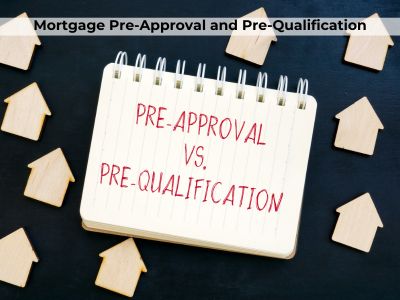Understanding the differences between mortgage pre-approval and pre-qualification can be difficult while navigating the mortgage sector. We’ll explain the main distinctions between these critical milestones in the home purchasing process in this short guide, assisting you in making decisions on your road to homeownership.
How Important Preparation Is mortgage pre-approval and pre-qualification?
Finding the ideal property is only one aspect of buying a home; another is acquiring the required financing. To make this fantasy a reality, the majority of homebuyers need a mortgage. Your capacity to repay that mortgage is of utmost importance to lenders. They consider your financial history, creditworthiness, income, and debt while determining this capacity. Pre-approval and pre-qualification are useful in this situation since they provide buyers and lenders a better idea of the potential size of the mortgage.
Mortgage Pre-Qualification: What is it?
Pre-qualification is a preliminary determination made by a lender to determine your potential eligibility for a mortgage loan based on your financial information provided orally or through a straightforward application. It’s an initial stage that doesn’t require a comprehensive credit check or a full examination of your financial situation.
What is the Pre-Qualification Process?
Pre-qualification is a straightforward process that may be finished quickly. Typically, it entails speaking with a mortgage broker or lender, whether face-to-face, on the phone, or online. The lender determines your borrowing capacity based on the fundamental financial facts you submit.
Pre-qualification benefits:
Pre-qualification is a quick process, and it is convenient. It may frequently be finished in a few minutes and provide you a rough idea of your possible borrowing capability. Getting pre-qualified enables you to create a rough budget for your house hunt. It’s a good place to start to comprehend the price range that you can afford. Pre-qualification normally does not entail a thorough investigation of your credit history, therefore it won’t have a negative impact on your credit score.
Limitations of Pre-Qualification:
Pre-qualification for a mortgage has several limitations:
Lack of Verification: Without any official verification, pre-qualification is based only on the information provided by the borrower. This may cause estimates of your borrowing power to be off.
No Credit Check: Since lenders normally do not run a credit check during pre-qualification, it is impossible to know whether you are creditworthy or whether your credit report contains any potential errors.
Uncertain Numbers: Pre-qualification provides a ballpark figure for how much you may be able to borrow. It excludes aspects that may have an impact on the final mortgage terms, such as interest rates, loan types, and other particular financial information.
No Guarantee: Being pre-qualified is not a guarantee that your mortgage application will be approved. It’s just the initial stage; a lender can subsequently find problems that impair your eligibility.
Subject to Change: Between pre-qualifying and actually applying for a mortgage, your financial status may change. This implies that when you’re ready to buy a property, the amount you’re pre-qualified for might no longer be true.
Limited Negotiation Power: In a competitive property market, sellers might not treat pre-qualification as seriously as pre-approval, which could limit your ability to negotiate.
Mortgage Pre-Approval: What is it?
On the other hand, mortgage loan pre-approval is a more thorough and official stage of the mortgage application procedure. It entails a careful review of your financial background, including credit records, employment confirmation, and income proof. When you receive a pre-approval, the lender commits in writing that you are conditionally authorized for a certain loan amount, subject to the property being successfully appraised.
How is Pre-Approval Done?
A formal mortgage application is normally submitted to a lender in order to obtain pre-approval. Giving thorough financial details, allowing a credit check, and presenting proof of your income, assets, and debts are all required steps in the procedure. This data is evaluated by the lender to establish the maximum mortgage amount you are eligible for, as well as the particular conditions and interest rates you might be offered. You are then given a pre-approval letter, which enhances your credibility as a serious buyer when looking at homes.
Advantages of Pre-Approval:
Pre-approval letters can provide you negotiating power by proving to sellers that you are a serious and qualified buyer. Pre-approved buyers’ offers are more likely to be taken into account by sellers. Pre-approval gives you a clear idea of how much you can borrow, which you may use to focus your house search within your budgetary constraints. The actual loan application process can be sped up, possibly resulting in a quicker closing, because much of the initial documentation has already been finished during pre-approval.
Limitations of Pre-Approval:
Expiration Date: Home financing pre-approval have an expiration date, so you must locate a home before that date passes.
No Guarantee: Pre-approval does not guarantee final mortgage approval; other variables may still come into play.
Financial Situations Changing: After receiving a pre-approval, significant financial changes may affect your ability to obtain a mortgage.
Property-Specific: Pre-approval for house loan is based on your financial situation and does not guarantee acceptance for a particular property.
Rate Lock Period: Until you have located a home and moved forward with the loan application, the interest rate mentioned in the pre-approval may not be locked.
Conclusion
It is crucial for any potential purchaser to comprehend the distinction between mortgage pre-approval and pre-qualification. Pre-approval offers a more firm commitment from the lender while pre-qualification only offers a brief estimate. Your particular demands and circumstances will determine which option you choose. Both are useful resources that can help you on your home-buying journey by assisting you in setting your budget and boosting your negotiating power. However, keep in mind that neither of these actions ensures loan approval, and the final choice depends on variables outside these preliminary actions. You can handle these procedures more effectively and confidently start your journey to homeownership by speaking with a mortgage expert.
FAQs
1. Does pre-qualification mean I’ll be approved for a mortgage?
Pre-qualification does not ensure mortgage approval, however it may help. It’s only an estimate at this point and hasn’t been thoroughly verified.
2. How long does a pre-approval letter for homebuyers last?
Pre-approval letters often have an expiration date, which is frequently between 60 and 90 days, however this can differ amongst lenders.
3. Can I start the homebuying process with just pre-qualification?
Although you can begin the process with a pre-qualification, getting a pre-approval is frequently advised for a more precise picture of your circumstances.




